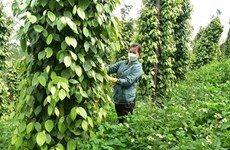Textile and garment materials to develop domestically
Vinatex has encouraged its member businesses and other enterprises in
the textile and garment industry to invest in production of materials
including fabric and fiber, and to form a complete material supply
chain. Report by the Vietnam Economic News.
Vinatex has encouraged its member businesses and other enterprises in
the textile and garment industry to invest in production of materials
including fabric and fiber, and to form a complete material supply
chain. Report by the Vietnam Economic News.
The textile and garment industry will be investing in material production, said Vietnam National Textile and Garment Group (Vinatex) Deputy General Director Hoang Ve Dung at a Ministry of Industry and Trade’s regular online meeting reviewing activities in September and the first nine months of this year.
The ministry’s statistics show that in the first nine months of 2013, the textile and garment industry exported products worth 13.154 billion USD, up 18 percent from the same time last year. The US, the EU, Japan and the Republic of Korea (RoK) were the biggest importers of Vietnamese textiles and garments, with exports to these markets accounted for 49, 15, 12 and 9 percent of the industry’s export revenue, respectively.
However, businesses said that they had to compete with rivals from other textile producing countries in buying materials, and that material suppliers took the advantage of material shortages to increase material prices by 10-15 percent. These problems affected the accomplishment of orders, they added.
Dung said that the textile and garment industry is relying considerably on imported materials and that the sector has satisfied only two percent of its demand for cotton and one eighth of its fabric demand and made 140,000 tonnes of low and normal quality fiber each year. Although it made strenuous efforts, the textile and garment sector could find only 48 percent of all materials it needed in 2013 domestically. The rate for VINATEX alone is 54 percent.
The Trans-Pacific Partnership Agreement (TPP) is expected to be signed in late 2014. Businesses must follow fabric and fiber origin principles if they are to benefit from tax preferences according to TPP. This means that Vietnamese textile and garment businesses must produce materials themselves apart from making products according to the order of foreign partners if they are to benefit from TPP-based tax preferences.
Vinatex has encouraged its member businesses and other enterprises in the textile and garment industry, including foreign direct investment (FDI) companies, to invest in production of materials including fabric and fiber and form a complete material supply chain. In the first half of this year, the group implemented 46 projects with a total investment capital of VND6.144 trillion, most of them are material production projects. Three fiber projects, including Vinatex-Hong Linh, Phu Bai 2 and Dong Van fiber plants have been put into production to provide the market with an additional 1,270 tonnes of Ne30 fiber. Besides, Vinatex put into operation its Yen My textile plant, while the Texhong Group from Hong Kong, China put into use a fiber plant in Quang Ninh Province. These projects are expected to add value to textile and garment products and decrease the sector’s reliance on imported materials, Vinatex Deputy General Director Dung said.
Speaking at the regular online meeting, Deputy Minister of Industry and Trade Le Duong Quang said that the Vietnamese textile and garment industry encourages foreign investors to invest in developing materials in Vietnam so as sector businesses can benefit from TPP-based preferences. But, foreign investment in this field should be controlled properly to avoid a situation in which FDI businesses sway the domestic textile and garment material market, he said.
Textile and garment businesses need to continue strengthening their positions in traditional markets and look for new, potential markets while taking the initiative in using resources and investing in equipment and technology. They also need to develop complete production processes, shift from making products according to the order of foreign partners to operating under the mode of FOB (free on board) and ODM (original design manufacturer) to add value to products, and strengthen their distribution networks to maintain niches in the domestic market.-VNA
The textile and garment industry will be investing in material production, said Vietnam National Textile and Garment Group (Vinatex) Deputy General Director Hoang Ve Dung at a Ministry of Industry and Trade’s regular online meeting reviewing activities in September and the first nine months of this year.
The ministry’s statistics show that in the first nine months of 2013, the textile and garment industry exported products worth 13.154 billion USD, up 18 percent from the same time last year. The US, the EU, Japan and the Republic of Korea (RoK) were the biggest importers of Vietnamese textiles and garments, with exports to these markets accounted for 49, 15, 12 and 9 percent of the industry’s export revenue, respectively.
However, businesses said that they had to compete with rivals from other textile producing countries in buying materials, and that material suppliers took the advantage of material shortages to increase material prices by 10-15 percent. These problems affected the accomplishment of orders, they added.
Dung said that the textile and garment industry is relying considerably on imported materials and that the sector has satisfied only two percent of its demand for cotton and one eighth of its fabric demand and made 140,000 tonnes of low and normal quality fiber each year. Although it made strenuous efforts, the textile and garment sector could find only 48 percent of all materials it needed in 2013 domestically. The rate for VINATEX alone is 54 percent.
The Trans-Pacific Partnership Agreement (TPP) is expected to be signed in late 2014. Businesses must follow fabric and fiber origin principles if they are to benefit from tax preferences according to TPP. This means that Vietnamese textile and garment businesses must produce materials themselves apart from making products according to the order of foreign partners if they are to benefit from TPP-based tax preferences.
Vinatex has encouraged its member businesses and other enterprises in the textile and garment industry, including foreign direct investment (FDI) companies, to invest in production of materials including fabric and fiber and form a complete material supply chain. In the first half of this year, the group implemented 46 projects with a total investment capital of VND6.144 trillion, most of them are material production projects. Three fiber projects, including Vinatex-Hong Linh, Phu Bai 2 and Dong Van fiber plants have been put into production to provide the market with an additional 1,270 tonnes of Ne30 fiber. Besides, Vinatex put into operation its Yen My textile plant, while the Texhong Group from Hong Kong, China put into use a fiber plant in Quang Ninh Province. These projects are expected to add value to textile and garment products and decrease the sector’s reliance on imported materials, Vinatex Deputy General Director Dung said.
Speaking at the regular online meeting, Deputy Minister of Industry and Trade Le Duong Quang said that the Vietnamese textile and garment industry encourages foreign investors to invest in developing materials in Vietnam so as sector businesses can benefit from TPP-based preferences. But, foreign investment in this field should be controlled properly to avoid a situation in which FDI businesses sway the domestic textile and garment material market, he said.
Textile and garment businesses need to continue strengthening their positions in traditional markets and look for new, potential markets while taking the initiative in using resources and investing in equipment and technology. They also need to develop complete production processes, shift from making products according to the order of foreign partners to operating under the mode of FOB (free on board) and ODM (original design manufacturer) to add value to products, and strengthen their distribution networks to maintain niches in the domestic market.-VNA













